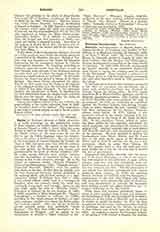

Bielski (or WOLSKI), MARCIN, a Polish chronicler, b. of noble parentage on the patrimonial estate of Biala (whence the family name), in the province of Sieradz, Poland, in 1495; d. there, 1575; the name Wolski is derived from his estate at Wola. One of two Polish writers, of the same name, he was the first to use the Polish language, hence his designation as the father of Polish prose. He was educated in the University of Cracow, founded by Casimir the Great in 1364, and spent some time with the military governor of that city. He served in the army in the wars against the Wallachians and Tatars, and participated in the battle of Obertyn (Galicia), 1531. He ranks among Poland‘s most prolific writers, and the development of historical studies in that country is due to his extensive writings. He is the author of numerous works: “Lywoty Filosofow” (Lives of the Philosophers, 1535); “Kronika Swiata” (Universal Chronicle, 1550-64), from the earliest time down to his day, divided into six periods, was the first important universal history published in the national idiom, and the first attempt at a comprehensive history of Poland, from 550 to 1580; in the second edition (1554) there is a reference to America; after the author’s death the work was continued, rearranged, and brought down to the year 1597, under the title of “Kronika Polska” (Chronicle of Poland) by his son Joachim (b. 1540; d. 1599), secretary to King Sigismund III; “Sprawa Rycerskiego”, a treatise on military art (1569), according to the Greek science of warfare, in eight parts, contains valuable data about the Polish army, and kindred subjects. After the demise of Bielski several satirical poems were published: “8eym Majowy”, (The May Diet, 1590), descriptive of the degradation of Hungary, and an appeal to his countrymen to emulate a higher standard of life: “Seym Niewiesci”, (Woman‘s Council, 1586-95), analytical of the then existing political conditions in Poland: “Sen Maiowy” (Dream of a Hermit, 1586); “Komedia Justina y Konstanciey” (Comedy of Justinian and Constantia, 1557).
JOSEPH SMOLINSKI

